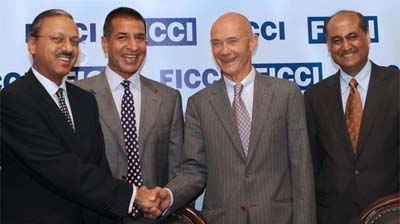From November 30 to December 2, 2009, after a spate of failed attempts to revive the WTO Doha Negotiations, a WTO ministerial conference will take place in Geneva. It’s a much-anticipated event given American President Barack Obama’s enthusiastic endorsement of the G-20 statement in April this year, calling for a conclusion of the Doha talks.
Developing countries are faced with a number of challenges to meet their development needs. These include addressing high levels of poverty, ensuring job creation, expanding their manufacturing bases and managing their resources. The question, in the context of the global economic and planetary crisis, is: will the WTO negotiations seek the opportunity to question unbalanced trade rules or continue negotiations within the current economic paradigm that essentially perpetuates underdevelopment in developing countries?
The current state of play amongst the WTO members— more so from developing countries—is that unless agreement is reached on agriculture and non-agricultural market access (NAMA), no negotiations will take place on other issues such as services, trade in environmental goods/services, trade facilitation and geographical indicators. The stalemate in the negotiations questions the legitimacy of the WTO to promote fair and balanced multilateral trade rules.
On agriculture, points of contestation are the elimination and/or reduction of trade distorting subsidies and substantial market access opportunities for developing countries’ agricultural goods. Developing countries that belong to the G-20 and are big industrial agricultural producers have formed a coalition. These countries are seeking greater market access in the developed world. Within the WTO’s Group of 33 (G-33) countries, there are also countries that have huge peasants, family, subsistence and small-scale farming communities. Vitally, these countries are calling for special safeguard measures to protect their small-scale and emerging farmers from the adverse effects of trade liberalisation. India, for example, belongs to both the G-33 and G-20. So while the G-20 is calling for greater market access, it will mostly benefit large-scale agriculture farmers and businesses, if at all. Furthermore, the WTO perpetuates the current permissive industrial agricultural production and trade system in genetically modified organisms and agrofuels (biofuels) that contribute significantly to climate change.
On NAMA, developing countries want guaranteed space for flexibility to design industrial, trade, technology and social policies unique to their situations. However, the challenge before them is how they use the policy space if they get it.
The New Delhi mini-ministerial meet on September 3-4, 2009, meant to energise the Doha trade talks, was timely. It came at a time when the shadow of one of the worst recessions was vanishing. A swift conclusion of the multilateral trade negotiations is expected to hasten the recovery of the world economy.
It was also opportune for India, perceived as a roadblock to progress in talks, to host a meeting on the Doha Round at the time. In July 2008, the western media had put the entire blame on the Indian Ministry of Commerce and Industry for not agreeing to the package. In the climate change talks too, India has been seen as the perennial objector. It is important for India to get proactive in resolving the blockages.
The two-day mini-ministerial meeting of some 36 trade ministers hosted by the GoI in New Delhi appears to have concluded with a few proposals to ‘re-energise’ the WTO Doha Round of multilateral trade negotiations, but with no movement on substance. One concrete suggestion by the ministers was to hold a senior officials’ meeting from September 14 onwards in Geneva to plan a road map for the next 2-3 months in order to see how the round can be concluded. The process will be carried forward by the Chairs of the Negotiating Groups in consultation with trade negotiators and senior officials. It is still unclear that the Geneva Ministerial (November 30-December 2) will be a ‘negotiating’ ministerial. India stressed the importance of moving on services and other parts of the agenda, in addition to agriculture and NAMA.
Against this backdrop, the importance of re-starting the talks and negotiations at the earliest can hardly be overlooked. One, it is going to determine the future role of the WTO as a facilitator of a multilateral trading regime. And, two, it will also determine the role of developing countries in world trade.
In spite of the all the furore over its success and future role, the WTO has no doubt gained in popularity over the years. It has been proved that trade liberalisation and poverty reduction go hand in hand. Therefore, it is clear that for small and poor countries the WTO is the right platform to go ahead with reforms and pursue their goals of economic development through enhanced trade liberalisation. However, one must remember that good trade policy begins at home. The surest way to liberalise and progress is to reform one’s domestic economy. Whether one follows the regional or multilateral track, reforming the domestic economy is imperative in order to maximise the gains from trade liberalisation.
The bottom line is that countries should follow unilateral trade policies suited to their own domestic needs but within the framework of the changing international trade environment.
Geethanjali Nataraj is fellow at NCAER, New Delhi.
This article originally appeared here in the Financial Express.

